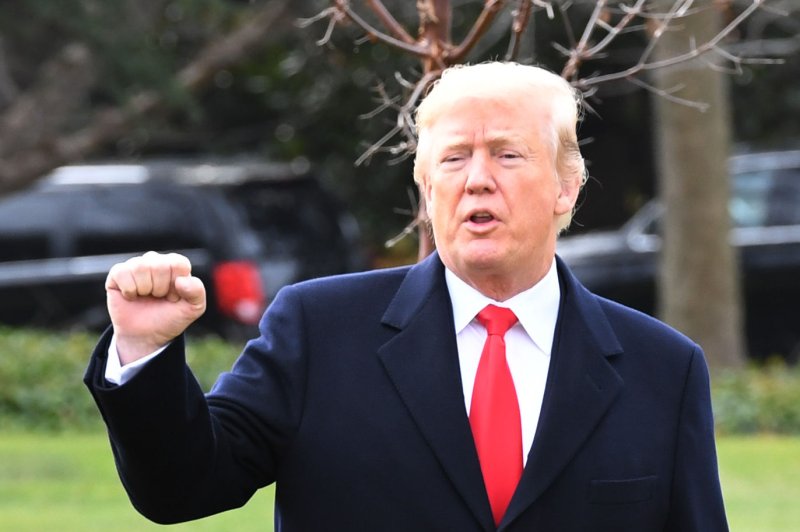President Donald Trump may hold the cards on whether crude oil markets spike in response to Iranian oil issues, not so much this weekend's political unrest, analysts say. File photo by Pat Benic/UPI |
License Photo
Jan. 3 (UPI) -- At this point, the oil market has factored in any risk from the political unrest gripping Iran, one of OPEC's top producers, analysts said.
More than a dozen people were reported dead in Iran after demonstrations against the rising cost of living boiled over to political unrest during the weekend. According to state broadcaster Press TV, the country's Interior Ministry said the situation by Tuesday was starting to return to normal after President Hassan Rouhani acknowledged some of their concerns.
The difference between supply and demand on the global market for oil is narrowing, leaving markets with little room to accommodate unrest in one of the strongest producers in the Organization of Petroleum Exporting Countries. Geopolitical risk was named as a factor for what could be a bullish year for crude oil prices, though market analysts said there's no indication that Iranian oil production was hampered by protest.
"The market appears to have priced in the risk to output at this point and is waiting on whether there is a further escalation in the Iran unrest," Paul Hickin, the oil director at commodity pricing group S&P Global Platts, told UPI.
Iran reported to OPEC economists that it produced almost 3.9 million barrels per day in November, the last full month for which data are available. That's up nearly 1 million barrels per day from before Iran and members of the U.N. Security Council, plus Germany, agreed on a nuclear step-back that brought sanctions relief to the Islamic republic.
Hickin said the only real risk for Iran is U.S. President Donald Trump, who must decide by Jan. 12 whether or not to issue a waiver on U.S. sanctions on Iran. Under the multilateral nuclear deal, formally the Joint Comprehensive Plan of Action, the president decides whether to go against the principles of the agreement and reinstate sanctions, or issue another waiver, as he did last year.
The lack of barrels on the market would likely drive the price of crude oil closer to $70 per barrel. Brent crude oil, the global benchmark, was priced near $67 per barrel early Wednesday.
Hedgeye Risk Management, whose analysts monitor OPEC maneuvers, said it believes the nuclear deal and U.S. waivers on sanctions are both in serious jeopardy. While members of President Trump's national security team may argue reinstating sanctions would only embolden the hardliners in Iran that see Washington as the enemy, Hedgeye said the president thinks those viewpoints lack merit.
Joe McMonigle, a senior energy analyst at Hedgeye, told UPI that political demonstrations haven't impacted production, and even renewed sanctions might not curb the country's actual output.
"Iran has shown it was able to add about 1 billion barrels per day in production all on its own," he said. "But Iran needs customers for that oil and the US sanctions will target the customers buying that extra 1 million barrels per day."
Trump's stance on major oil producers was questioned in the past. The administration last year considered tightening sanctions on Venezuela, where energy represents about 95 percent of its export economy. That move would've created U.S. problems as well because, for the refiners concentrated on the U.S. Gulf Coast, Venezuela is the largest source of crude oil, ahead of Saudi Arabia.















